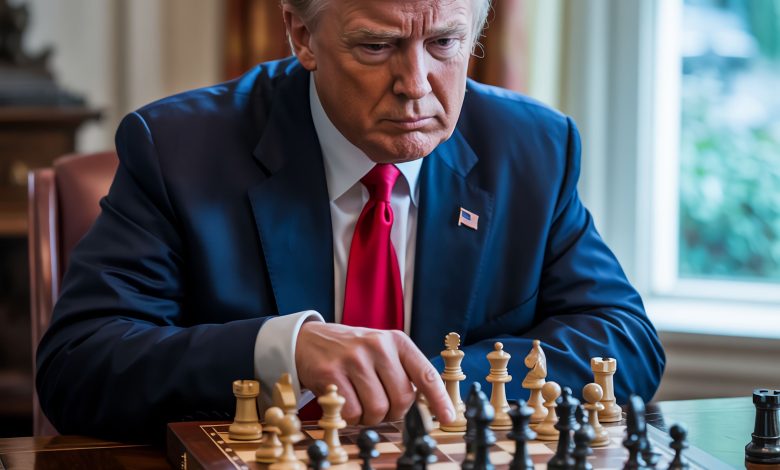
You have to admire the confidence. Democrats stride into the post-election glow with their victory playlists cued, champagne still cooling, and headlines blaring “Democrats had a big night.”
They treat wins in Virginia, New York City, and California like a triumphant chorus line — synchronized, self-congratulatory, and utterly convinced they’ve secured the moral high ground. Cue the orchestra, hand them their Emmy; they’ve done it again.
Then President Trump drops four words on Truth Social and the room goes quiet: “AND SO IT BEGINS!”

It reads like a movie title and a dare. It’s a one-liner with a bull’s-eye on it — part declaration, part taunt, and wholly intentional.
The former reality-TV star-turned-president didn’t whisper this; he yelled it in all caps because it’s supposed to be heard. This is not just rhetoric. It is an attitude — a pivot from defense to offense — and it’s exactly the kind of theatrical punctuation Mr. Trump understands.
Let’s not pretend both sides aren’t playing the same, ancient game: win at the ballot box, then rewrite the rules so the next time the wind shifts, you still win. Democrats celebrated victories in Virginia (a statewide sweep that restores their control). Next, they won in New York City’s high-profile mayoral race, and in California where a major redistricting ballot measure passed — wins that, for them, read like vindication. But to Trump and his allies, those victories are the opposite: they’re a flashing neon sign that the political pressure is working, and now it’s time to escalate the chess match to a level where blue-state advantages can be neutralized.
And so it begins is the seed. Now watch the garden grow — thorny, loud, and a little bit dangerous.
Because if you read those four words as a straightforward promise of policy, two immediate follow-ups occur on the public record.
First: the White House — through spokespeople — signaled interest in stronger federal moves on election procedures, specifically criticizing universal mail-in ballots in states like California and hinting at executive steps to tighten federal oversight.
Second: Republican strategists immediately pivot to a playbook that targets state-level vulnerabilities — oversight, litigation, funding restrictions, and regulatory pressure — all lawful levers that, when used cleverly, can alter how elections look and function in blue states.
Now, let’s unpack the theater and the mechanics.
Theater matters. Trump’s four words are theater with a policy undercurrent: he’s signaling that the administration will treat these wins not as a cause for surrender but as a call to action. The policy moves that follow could include more aggressive federal oversight claims, DOJ civil suits or criminal inquiries into election administration irregularities, heightened funding conditions from federal grants tied to state election practices, and even executive orders designed to standardize election procedures when federal interests are implicated. Remember: the White House doesn’t need to nationalize every municipal election to change the incentives that states and cities face; it simply needs to change the costs and consequences of certain behaviors.
CalMatters reported that White House aides were publicly discussing stronger responses to mail-ballot systems and pledged reviews — not fantasy, but a deterministic posture.
But before we start stockpiling popcorn for an all-out constitutional brawl, let’s be honest about what’s plausible and what’s clickbait.
Federal power over elections is bounded — the Constitution leaves much election administration to the states — but the federal government still has a lot of tools: the Voting Rights Act and its enforcement (to the extent it’s applied), federal criminal statutes, DOJ civil suits, conditional federal funding, administrative regulation where federal programs touch state processes, and the bully pulpit (which, yes, can move markets and bureaucracies). All of this can be used creatively to pressure blue states into reform, or at least to force a costly legal war. And that cost is the point: if the federal government levies penalties, threats of investigations, or regulatory headaches that slow blue-state economies, the political calculus of local elites shifts. The pain can be persuasive. (Ask any bureaucrat — budgets cure ideology faster than sermons.)
There’s also an ironic virtue to this escalation. Democrats, in their victory lap, acted as though they had built an impregnable electoral cathedral.
In practice, they’ve only painted the doors red, then left the keys dangling. Victories in the public arena mean more eyes on how those victories were engineered. When a government agency or local official wins big, it invites scrutiny. Big wins attract bigger audits. Big grants attract bigger accountability. So the celebration that Democrats think is a coronation actually hands their opponents a microphone and a magnifying glass.
Which brings us to the uncomfortable truth for Democrats: where you build systems that centralize and normalize one party’s advantage — universal mail ballots, ballot harvesting (where legal), opaque procurement of election technology, expansive ballot-drop networks without rigorous chain-of-custody controls — you also create points of leverage. Trump’s line was not mysticism; it was market research. He observed the environment, smelled the weak seams, and yelled at them. The reaction from the White House — talk of executive action and legal review — is exactly what you expect when someone smells a market inefficiency: move in, buy low, sell politically high.
Of course, let’s be precise: voter fraud in the sense of ballots being fabricated en masse is, empirically, exceedingly rare. Neutral reporting on California’s mail-in system notes studies finding little evidence that mail ballots increase fraud. If you’re a conservative seeking to retain credibility, don’t pretend every lost election is theft; treat the rare real cases as proof-of-concept and the structural asymmetries as the real problem. In other words: don’t cry wolf — change the wolf’s habitat.
So what might the next phase look like practically? Expect a three-pronged offensive:
-
Legal pressure and litigation. Use existing federal statutes and targeted investigations to force public disclosure and audits of ballot chain-of-custody, vendor contracts, and ballot-processing procedures. Legal discovery is a tool that can expose sloppy or partisan practices and create costly settlements or injunctions for local governments.
-
Regulatory and funding levers. Condition federal grants (transportation, housing, infrastructure) on compliance standards tied to election administration where federal funds intersect. It’s not direct control of local elections — it’s tying outcomes to compliance in other domains. That’s how federal leverage has always worked.
-
Narrative and political pressure. Use federal reports, DOJ statements, and the presidential podium to define narratives that put local officials on the defensive. Political pressure moves markets (labor, investment, even tourism). If a city looks like a perpetual legal minefield, businesses notice. That economic pain changes politics faster than half a dozen op-eds.
Those moves are legal and, frankly, bureaucratically lethal. They may not win a zero-sum legal fight overnight, but they can make operating a blue-state election machine expensive and politically risky. Cost becomes a disincentive, and disincentive produces behavior change.
Democrats like to cast themselves as guardians of morality and process.
They prate about fairness and virtue while engineering systems that advantage their candidates. That’s not a scandal; it’s human politics. We do it on both sides. What changed with Trump’s four words is the willingness to admit that the game is a game and to play it ruthlessly and publicly. Democrats may have won elections, but they haven’t won the next phase of the war — the one that’s about rules, incentives, and consequences. The gloves aren’t only off; they’ve been repurposed into boxing lessons.
If you’re cheering for one side or the other, lean into strategy, not melodrama. If Trump is saying “AND SO IT BEGINS,” he’s promising to make politics costly for his opponents — and in modern politics, costs are sometimes the only language that persuades entrenched machines to change.
The Democrats’ big night may have been a party. But every party has a hangover. And if those hangovers come with subpoenas, audits, and tightened federal scrutiny… well, that’s governance. Call it revenge, call it oversight, call it politics. Either way, the next chapter is coming — and it will be louder than the victory playlists.



